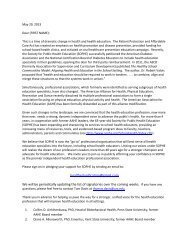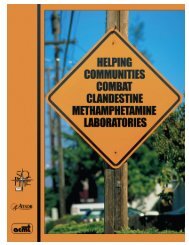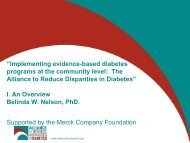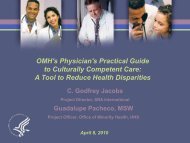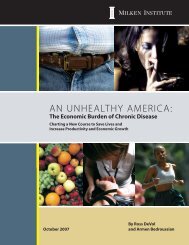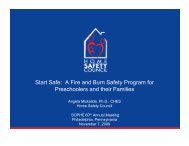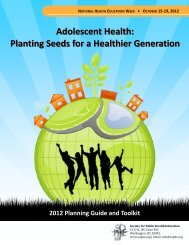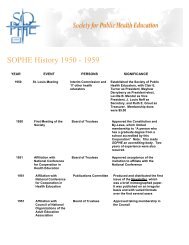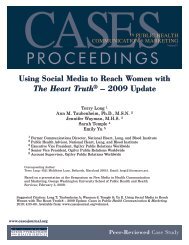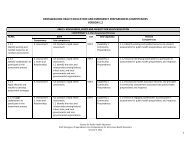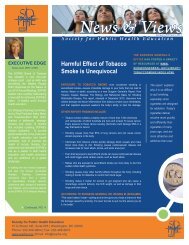to view the program - Society for Public Health Education
to view the program - Society for Public Health Education
to view the program - Society for Public Health Education
You also want an ePaper? Increase the reach of your titles
YUMPU automatically turns print PDFs into web optimized ePapers that Google loves.
a thorough understanding of African American culture and events<br />
that shaped <strong>the</strong> way that African Americans seek and receive health<br />
services. Additionally, <strong>the</strong> course emphasized recognizing <strong>the</strong> impact<br />
cultural competency has on an organization’s ability <strong>to</strong> provide culturally<br />
and linguistically competent healthcare services. Results: The skills<br />
building course has trained 323 participants over a 4 year period from<br />
5 different states. Program evaluation data has revealed that 80% of<br />
<strong>the</strong> participants strongly agreed that <strong>the</strong>ir awareness about cultural<br />
competence had increased due <strong>to</strong> <strong>the</strong> course. Additionally, 89.86% of<br />
<strong>the</strong> participants strongly agreed that <strong>the</strong>y would apply <strong>the</strong> cultural<br />
competence skills taught in <strong>the</strong> class in <strong>the</strong>ir healthcare organizations<br />
within <strong>the</strong> next three months.<br />
24. Horizons: Understanding core intervention components<br />
of a best-practice HIV prevention intervention <strong>for</strong> African<br />
American Adolescent females<br />
Tiffaney Renfro, MSW, BSHE/RSPH/Emory University; Teaniese<br />
Latham, MPH BSHE/RSPH/Emory University ; Lorin Boyce, MA,<br />
BSHE/RSPH/Emory University; Jessica Sales, PhD, BSHE/RSPH/<br />
Emory University; Ralph DiClemente, PhD, BSHE/RSPH/Emory<br />
University ; Eve Rose, MSPH, BSHE/RSPH/Emory University<br />
Background: While <strong>the</strong>re are HIV prevention intervention <strong>program</strong>s<br />
available <strong>for</strong> African American adolescent females, few have been<br />
designed specifically focusing on high-risk sexually active adolescents.<br />
To address this need, we developed an intervention <strong>for</strong> African<br />
American adolescent females, aged 15-21 years, seeking sexual health<br />
services. Theoretical framework: The HORIZONS intervention was<br />
based on Social Cognitive Theory and Theory of Gender and Power.<br />
Hypo<strong>the</strong>sis: We hypo<strong>the</strong>sized that a gender and culturally-appropriate<br />
STD/HIV intervention would be effective in reducing adolescents’<br />
risk <strong>for</strong> Chlamydia and behaviors associated with human immunodeficiency<br />
virus (HIV) acquisition. Method: African American adolescent<br />
females (N=715), ages 15-21 years old, seeking services at one of three<br />
sexual health clinics in a metropolitan area were enrolled in <strong>the</strong> study.<br />
Eligibility criteria included self-identifying as African American,<br />
female, ages 15-21 years, and reporting vaginal intercourse in <strong>the</strong> past<br />
60 days. HORIZONS participants received 2, 4-hour group sessions<br />
and 4 telephone contacts over a 12-month period. Group sessions were<br />
facilitated by two African American female health educa<strong>to</strong>rs and <strong>the</strong><br />
4 telephone contacts were administered by one African American<br />
health educa<strong>to</strong>r. The intervention targeted personal, relational,<br />
sociocultural and structural fac<strong>to</strong>rs associated with adolescents’ STD/<br />
HIV risk. Intervention participants received vouchers <strong>to</strong> encourage<br />
male partner’s STD testing/treatment at sexual health clinics. Results:<br />
Over <strong>the</strong> 12-month follow-up, fewer participants in <strong>the</strong> intervention<br />
had a chlamydial infection or recurrent chlaymydial infection.<br />
Participants in <strong>the</strong> intervention also reported a higher proportion of<br />
condom-protected sex acts and consistent condom use in <strong>the</strong> 60 days<br />
preceding follow-up assessments. In addition <strong>to</strong> being a successful<br />
intervention, participants gave favorable ratings of interventionists and<br />
workshop activities. Conclusion: HORIZONS demonstrated evidence<br />
in reducing chlaymydial infections and enhancing STD/HIV preventive<br />
behaviors and psychosocial media<strong>to</strong>rs <strong>for</strong> STD/HIV preventive<br />
behaviors Implications <strong>for</strong> practice: For interventionists, <strong>the</strong>re is great<br />
utility in understanding intervention components, especially when <strong>the</strong><br />
interventions have been proven efficacious in a randomized controlled<br />
trial.<br />
25. Weaving Web 2.0 <strong>to</strong> In<strong>for</strong>m Diverse Audiences on a New<br />
Advanced-level Certification<br />
Linda Lysoby, MS, CAE, CHES, National Commission <strong>for</strong> <strong>Health</strong><br />
<strong>Education</strong> Credentialing, Inc; Melissa Rehrig, MPH, CHES,<br />
NCHEC; Beth Chaney, PhD, CHES, University of Florida, Kelly<br />
Wilson, PhD, CHES, Texas State University,<br />
Background/Theoretical Basis: For <strong>the</strong> first time in 2011, <strong>the</strong><br />
National Commission <strong>for</strong> <strong>Health</strong> <strong>Education</strong> Credentialing (NCHEC)<br />
will be granting an advanced-level credential, <strong>the</strong> Master Certified<br />
<strong>Health</strong> <strong>Education</strong> Specialist (MCHES). This certification was based<br />
on <strong>the</strong> research of <strong>the</strong> <strong>Health</strong> Educa<strong>to</strong>r Job Analysis (HEJA), which<br />
was released in 2010 and confirmed <strong>the</strong> findings of <strong>the</strong> Competency<br />
Update Project of 2005. Both national studies were conducted by using<br />
a systematic approach <strong>to</strong> delineating <strong>the</strong> types and levels of practice<br />
among health educa<strong>to</strong>rs. In addition <strong>to</strong> <strong>the</strong>se studies’ results, <strong>the</strong><br />
introduction of an advance- level certification is a recommendation of<br />
<strong>the</strong> National Task <strong>for</strong>ce of Accreditation. Methods and Partnerships:<br />
Web 2.0 technology has trans<strong>for</strong>med <strong>the</strong> way in which in<strong>for</strong>mation<br />
is shared. For <strong>the</strong> field of health education and promotion, Web 2.0<br />
technology has enhanced health communication techniques and fostered<br />
a greater reach of messages. On September 17, 2010, <strong>the</strong> National<br />
Commission <strong>for</strong> <strong>Health</strong> <strong>Education</strong> Credentialing and <strong>the</strong> University<br />
of Florida’s (UF) College of <strong>Health</strong> and Human Per<strong>for</strong>mance<br />
(HHP) partnered <strong>to</strong> use Web 2.0 technology <strong>to</strong> host MCHES<br />
Live: The Webinar Series. The purpose of <strong>the</strong> webinar series was <strong>to</strong><br />
provide individuals with <strong>the</strong> in<strong>for</strong>mation needed <strong>to</strong> prepare <strong>for</strong> <strong>the</strong><br />
implementation of <strong>the</strong> new advanced-level certification, <strong>the</strong> Master<br />
Certified <strong>Health</strong> <strong>Education</strong> Specialist (MCHES). Intervention and<br />
Implications: Specifically, <strong>the</strong> series consisted of three webinars <strong>for</strong> <strong>the</strong><br />
following target audiences: university faculty and administra<strong>to</strong>rs, current<br />
CHES and non-CHES interested in pursuing <strong>the</strong> advanced-level<br />
credential, and designated providers and employers. The webinar series<br />
was very well attended, with 1, 199 individuals registered, and a <strong>to</strong>tal<br />
of 956 people actually logged in, and participated in <strong>the</strong> webinar series<br />
that day. Feedback from <strong>the</strong> event has been incredibly positive, with<br />
individuals requesting additional in<strong>for</strong>mation on various <strong>to</strong>pics (i.e.<br />
*Denotes Poster Promenade<br />
SOPHE-NACDD 2011 Joint Academy and Midyear Scientific Meeting 51




